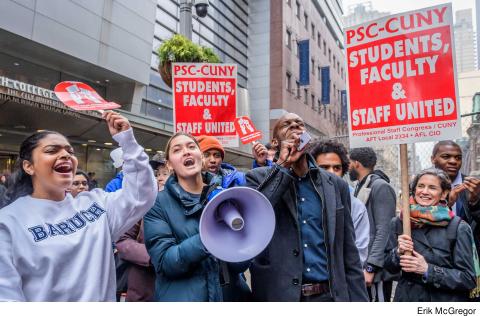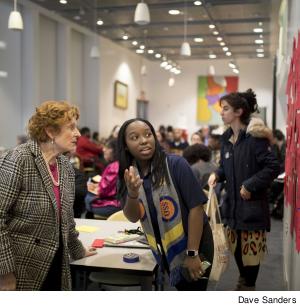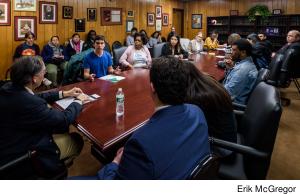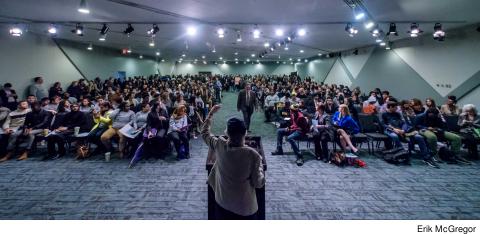Actions on March 12 and 13 citywide
 |
March is the final month of state budget negotiations. Lawmakers from both houses are meeting with lobbyists, advocates and constituents. The annual fiscal saga will end when the leaders of both houses reach a budget agreement with Governor Andrew Cuomo by the end of this month.
 |
But this year needs to be different, PSC leaders have said. They are calling on the new Democratic majority in the New York State Legislature to be as progressive on fiscal policy this year as it was on other kinds of policy last year. The Democratic majority elected to the NYS Senate passed a series of sweeping progressive reforms in 2019 – on rent regulations, voter rights, criminal justice, women’s rights, the DREAM Act and more.
“Those victories were tremendous,” said PSC president Barbara Bowen, “and many PSC members supported them and celebrated them. Our members also worked hard to get progressive Democrats elected.” She continued, “But the new legislature has yet to crack the hardest nut of all – the state’s fiscal policy of unforced austerity. In many ways, that is the most consequential policy of all, and it is destroying CUNY. That policy must change.”
WORKING WITH OTHERS
PSC leaders spent the summer and fall studying the tactics of the organizations and coalitions that succeeded last year, and they have developed a budget campaign that builds on what they learned. The key, they say, is volume. Advocates for rent reform succeeded in part because they demonstrated repeatedly in Albany and sent tens of thousands of social media messages to local legislators.
With a membership of 30,000 people, the PSC can do the same. The union has organized a social media team that posts coordinated messages every week, a “flying squad” that stands ready to make quick visits to Albany and legislative hearings, a team of state legislators who have pledged to work with the PSC for CUNY funding, and a joint advocacy day with CUNY and SUNY students that brought 700 students to the capital.
 |
“Members sometimes tell me that contacting Albany won’t make a difference,” said PSC Legislative Representative Mike Fabricant. “We have seen that that’s not true, at least with the new majority in the Senate and progressive legislators strongly backed by the PSC. If you are experiencing the effects of the chronic underfunding of CUNY – and there is no one who isn’t – you should make your voice heard.”
On Thursday, March 12, everyone in the union is being asked to participate in at least one action to demand an end to the fiscal starvation of CUNY. Members who cannot join the protest actions on their campuses can post to social media, call their state senator make themselves heard in other ways. And everyone is being asked to wear “red for ed” and sport the color adopted by teachers mobilizing for education.
Hundreds of faculty and staff have completed the sentence the union suggested (see “15-minute activist”) on what the budget emergency means for them.
“I read every one that comes in,” said Bowen. “It’s impossible to do that without becoming filled with rage. Every single one of us is being hurt by Albany’s planned impoverishment of CUNY. Everyone has something to say to Albany and City Hall on March 12.”
 |
REACHING OUT
“We spoke to senators who are representatives of the city, so most of them knew about CUNY. What we had to do was make a case for why we need more money, said Scott Sheidlower, the PSC chapter chair at York College, who went on the lobbying trip at the beginning of February. “The union is up there making the case for CUNY. CUNY needs the money for the lights, to pay for the contract, to pay for student resources.”
Sheidlower said that the lawmakers he met “were very receptive and, of course, one of the arguments I made is that CUNY helps people become part of the community, become part of larger society.”
“We don’t want lawmakers to have a moment when they’re considering the budget and they don’t see us,” said PSC First Vice President Andrea Vásquez, who is coordinating the work of the flying squad. “We want them to always see PSC pressing for CUNY.”
The union is a part of a coalition demanding that, in light of the governor’s budget proposal, the state look to raise revenues for the state’s public services. The coalition’s motto is: tax the wealthy.
The call for such fundamental change has not gone unnoticed in the press, with various media reporting on union calls for new revenue to address the $6 million budget gap the governor is citing to justify, as Spectrum News reported, “pushing more of the burden from ballooning Medicaid costs onto localities which teachers’ union claim could leave little money for schools and other priorities.”
ELECTION YEAR
PSC leaders noted that 2020 is an election year for state lawmakers. The assembly has shown more interest in the idea then the senate or the governor, and the revenue coalition that the PSC is a part of has proposed various ideas that could be included in the assembly one-house budget resolution.
PSC activists have assembled a team of legislative allies, including several representatives who just arrived in Albany last year. Senator Jessica Ramos, chair of the Senate Labor Committee, said on Facebook, “There are 112 billionaires living in [New York] collectively worth over $500 billion…. Taxing the ultra[-]wealthy must be an option if we want to keep our talented workforce!”
One shouldn’t be fooled into thinking hiking levies on the state’s wealthiest people is a radical, fringe idea that cannot gain traction. Polling conducted by NYSUT found that the notion is popular.
“The survey … found 92% of respondents support increasing revenue by applying a 2% state tax on a taxpayer’s wealth greater than $1 billion, raising the state income tax rate on income above $5 million per year and placing a new tax on luxury homes and apartments in New York that are worth more than $5 million and are not a primary residence,” the New York Daily News reported. “The poll found that 64% of voters say implementing new taxes on the super-rich would have a positive impact on New York’s economy. Another 72% say they are more likely to vote for a candidate who favors passing new taxes on ultramillionaires.”
“Cuomo has made it his brand to limit the state budget to a 2% increase from the previous year, but we’re facing a $6 billion budget hole, so the old model of refusing to raise revenue can’t hold anymore,” said Susan Kang, an associate professor of political science at John Jay College. “He needs to put forth a budget that includes things like the expansion of the mansion tax, a financial transaction tax and upper brackets on city taxes.”
HURT BY THE CAP
The PSC’s testimony at a State Senate budget hearing in Manhattan argued that CUNY is triply hurt by the 2% spending cap. Students and unionists have staged several protests in support of more funding for public higher education during the Spring semester, and the union – along with student allies – have held town halls to address the chronic underfunding of CUNY at City Tech and Hunter College (another forum was scheduled to take place at Lehman College as this newspaper went to press).
PSC plans actions on several CUNY campuses on March 12 and 13. Members have been promoting the union’s agenda for more funding on social media during the budget negotiations. The union is pushing every PSC member to take action in support of increased funding for CUNY. Members can also send letters to elected officials via the PSC website.
The budget emergency at CUNY is sabotaging our students, our work, our health, our future. It’s time we transferred the crisis to Albany by taking action together. Everyone can do something on March 12 to stop the starvation of CUNY. Tell us here that you will wear #redfored and take at least one action on Thursday, March 12 to demand an end to the budget crisis. You can join a protest on your campus, post a #redfored selfie, call or email your legislators, or mobilize for a rally outside a legislator’s district office. The state budget will be decided by April 1. This is the time to act!

